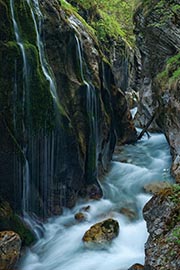The Jena Mahler cycle enters the home stretch. Short works by Andrea Lorenzo Scartazzini preceding each Mahler symphony have become an integral part of concerts for audiences. At the beginning of March, “Anima” was performed before Mahler’s Eighth.
Summer 2018 saw the beginning of the large-scale Mahler-Scartazzini cycle by the Jena Philharmonic, which reaches its conclusion in January 2025 with a performance of Gustav Mahler’s Tenth Symphony. At the beginning of the plan, there was some scepticism about performing short orchestral works before each Mahler symphony. But Andrea Lorenzo Scartazzini has succeeded in rising to the challenge by creating a varied and exciting cycle, rich in references. As he does not take thematic material as his starting point, and avoids the content of the symphonies and making quotations, his music succeeds in holding its own against the emotional weight and power of Mahler. Scartazzini wanted “to create something which endures”, and he has succeeded in that. The orchestra, its chief conductor (and instigator of the cycle) Simon Gaudenz, but also the Jena audience have reacted enthusiastically to the composer’s “new sound worlds”. In addition, the short orchestral works have taken on a life of their own independently from the cycle.
Meanwhile, the cycle has reached Mahler’s Eighth Symphony, a work which divides opinions like no other: enthusiasm on the one hand and misunderstanding on the other, there appears to be no middle ground between the two – a difficult starting-point for Scartazzini. For the Eighth, he had “a setting for alto, chorus and orchestra” in mind, thereby creating a link back to his fourth composition Incantesimo for soprano and orchestra. Whilst Scartazzini set a text by Joseph von Eichendorf in 2019, with this new piece he wanted to draw on Goethe, as Mahler had. During his researches, he came across an interesting thematic link in the mountain gorge scene from Goethe’s “Faust Part II”, which Mahler set in the second part of his Eighth Symphony: “There the purification of Faust’s soul is described as it ascends to the heavenly spheres. Angels and saints accompany it on its way up after they have wrested it from Mephisto and his devilish helpers. This surreal and magnificent scene has long fascinated me; I am very familiar with it from my time as a student of German and later as a German teacher.” Finally Scartazzini came across a poem which Goethe wrote during his travels in Switzerland in 1779 as a thirty-year-old: “Gesang der Geister über den Wassern” [Song of the Spirits over the Waters]. This is also about the “journey of a soul”. In the Lauterbrunnen Valley, in front of an impressive waterfall, Goethe perceived an analogy between the human soul and the water: “He compared the journey of the soul with the ascent to heaven and descent to earth in a perpetual repetition, just as water rises and falls in a constant cycle.” What pleased the composer in particular was the “depiction of the cyclical life on earth with the ascent and descent of the soul”. Here, Scartazzini sees an idea formulated which was to be impressively developed much later in Faust’s “Himmelfahrt” [ascent to heaven]. With this, a thematic link is created to the mountain gorge scene, in which Faust’s soul is purified during the ascent into the higher spheres. “The ‘Gesang der Geister’ would, so to speak, be the allegorical idea and the ‘Mountain Gorges’ scene its manifestation through Faust.” As well as this, the water metaphor attracted the composer to write a musical setting using rather dark-coloured reduced orchestral forces, with choral parts with instruments and noises. Andrea Lorenzo Scartazzini says that his long preoccupation with Mahler had a greater effect on his own “musical expressiveness” than he had originally thought. He increasingly includes “romantic and free-tonal elements and repetitions” as musical means. But what could perhaps be regarded as a retrograde step from avantgarde points of view, has become increasingly important to Scartazzini in the emotional quality of his music, for his wish is that “music should give sound to emotions and arouse emotions”.
Robert Krampe
(from [t]akte 1/2024 – translation: Elizabeth Robinson)



